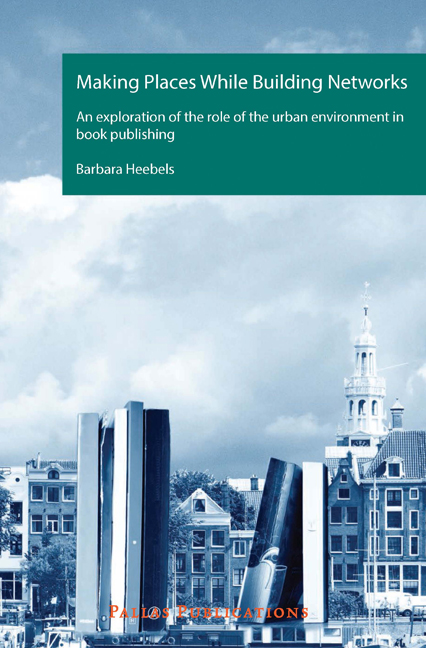Book contents
- Frontmatter
- Dedication
- Contents
- 1 Introduction
- 2 Creative Clusters in Berlin: Entrepreneurship and the Quality of Place in Prenzlauer Berg and Kreuzberg
- 3 Performing in Dutch Book Publishing 1880–2008: the Importance of Entrepreneurial Experience and the Amsterdam Cluster
- 4 Place-making from Publishing house to Book Fair: Dutch Book Publishers and the Role of Place in Establishing Trust and Reputation
- 5 Social Networks and Cultural Intermediaries: the Multiplexity of Personal Ties in Publishing
- 6 Conclusions
- References
- Appendix A Descriptive Statistics & Correlations
- Appendix B Characteristics of Interviewees
- Nederlandse Samenvatting
- Frontmatter
- Dedication
- Contents
- 1 Introduction
- 2 Creative Clusters in Berlin: Entrepreneurship and the Quality of Place in Prenzlauer Berg and Kreuzberg
- 3 Performing in Dutch Book Publishing 1880–2008: the Importance of Entrepreneurial Experience and the Amsterdam Cluster
- 4 Place-making from Publishing house to Book Fair: Dutch Book Publishers and the Role of Place in Establishing Trust and Reputation
- 5 Social Networks and Cultural Intermediaries: the Multiplexity of Personal Ties in Publishing
- 6 Conclusions
- References
- Appendix A Descriptive Statistics & Correlations
- Appendix B Characteristics of Interviewees
- Nederlandse Samenvatting
Summary
Summary of main findings
Using a combination of qualitative and quantitative research methods, this thesis critically examined the role of urban place in publishing through a dynamic and multidimensional conception of place and an exploration of personal networks. The empirical analyses enhance our understanding of how place is employed in creating and selling a cultural product. This was investigated from the relatively unexplored angle of the publisher as cultural intermediary who plays a key role in bringing together culture and commerce. The research aimed to answer the research question: To what extent do book publishers benefit from being located in urban places, and how do they employ those places to create and sell their cultural product? The analyses were structured around four sub research questions that are answered in this section. This is followed by the main conclusions, a critical reflection and recommendations for further research.
The importance of different dimensions of place was first explored in Chapter 2 for cultural-product entrepreneurs. This chapter provided an answer to the research question:
1) To what extent and in what ways do the utilitarian and symbolic values of urban place play a role in the location choice and location evaluation of cultural-product entrepreneurs?
While the cluster literature has primarily stressed the utilitarian value of place and the importance of local proximity to other cultural product industries for informal exchange of knowledge, the empirical analysis showed that the symbolic value of place, namely experiencing its look and feel, was more important. The entrepreneurs interviewed indicated that they looked for relatively inexpensive office space in an environment that complied with the look and feel that fitted their search profile. For most entrepreneurs, this profile included (perceived) authenticity, historical value and an environment with a certain roughness, although some also looked for beautifully renovated buildings and fashionable architecture. While experiencing and dwelling in their local environment was important for entrepreneurs for stimulation and inspiration, they primarily used the symbolic value of their local environment to stress their creativity and to reproduce and strengthen their reputation as cultural-product entrepreneurs.
- Type
- Chapter
- Information
- Making Places While Building Networks An exploration of the role of the urban environment in book publishing , pp. 137 - 152Publisher: Amsterdam University PressPrint publication year: 2012



